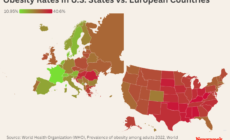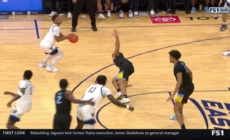-
DOGE Stimulus Check Creator Wants it to Motivate People to Report Waste - 7 mins ago
-
Body of Shiri Bibas handed over; release of six more hostages underway - 11 mins ago
-
Eagles LB Nolan Smith played through Super Bowl LIX with torn triceps - 31 mins ago
-
Taylor Swift’s ‘It Ends With Us’ connection uncovered in resurfaced interview - 44 mins ago
-
Map Reveals How Obesity Rates in the U.S Compares to Europe - 49 mins ago
-
In reversal, Trump says Russia attacked Ukraine - about 1 hour ago
-
Jhamir Brickus drops his defender and drains a stepback 3-pointer, extending Villanova's lead vs. Marquette - about 1 hour ago
-
Winter Weather Warnings in 4 States As Blowing Snow To Strike - about 1 hour ago
-
Playboy 2025 Playmate of the Year Gillian Nation leads magazine’s comeback - 2 hours ago
-
Coen Carr throws down vicious alley-oop on fastbreak, extending Michigan State's lead vs. Michigan - 2 hours ago
Transgender Athlete’s Win in Maine Sparks Backlash
A transgender high school athlete’s victory in a Maine state pole vaulting competition has reignited the debate over transgender participation in girls’ sports.
The competition, held on Monday, saw Katie Spencer, a transgender athlete from Greely High School, win the Class B state championship in pole vaulting with a jump of 10 feet, 6 inches. Her victory helped Greely secure the overall girls’ team title by just one point.
Why It Matters
The inclusion of transgender athletes in women’s sports has drawn increasing criticism from conservative groups, who argue it creates an unfair competitive advantage and raises safety concerns. The issue has become a key talking point in Donald Trump’s reelection campaign, despite transgender athletes making up a small minority in college sports.
Earlier this month, President Trump fulfilled a campaign promise by signing an executive order barring transgender athletes from competing in girls’ and women’s sports. The order allows federal agencies to withhold funding from organizations that do not comply with Title IX as interpreted by the Trump administration, which defines “sex” as the gender assigned at birth.
What to Know
Spencer’s win played a decisive role in Greely High School clinching the overall girls’ state championship by a single point, a result some argue altered the competition’s outcome. She cleared 10 feet, 6 inches in the Class B girls’ pole-vaulting championship, finishing more than six inches ahead of the next-best competitors.
Her victory gained national attention after State Representative Laurel Libby, a Republican, posted about it on Facebook, highlighting that Spencer had competed in the boys’ division just two years earlier, where she placed fifth in the same event.
“Girls’ sports have come a long way, and I think we have a responsibility to protect Maine girls and ensure they have a level playing field,” Libby said in an interview with WMTW.
Getty Images
Her post has since generated over 42,000 comments, reflecting a deeply divided public response. Some have accused Libby of bullying, while others argue that transgender athletes should not compete in girls’ divisions.
The controversy has also drawn attention to Maine’s policies on transgender athletes. The Maine Principals’ Association (MPA), which governs high school sports in the state, recently announced it would not enforce Trump’s executive order banning biological males from competing in girls’ sports. This decision contradicts the federal directive, which warned that schools allowing transgender participation could face a loss of federal funding.
“The decision by the Maine Principals’ Association is outrageous. It violates President Trump’s executive order and jeopardizes the safety and privacy of female athletes,” Libby said.
The Independent Council on Women’s Sports (ICONS), an advocacy group that opposes transgender athletes competing in women’s sports, criticized Spencer’s victory. In a post on X (formerly Twitter), the group stated, “Maine awards the girls’ state pole vault title to a male athlete competing in the girls’ division. Greely High School’s male star vaulter, Katie Spencer, not only won the event but also helped secure his girls’ team the overall state championship by just one point.”
What People Are Saying
Allen Cornwall, a longtime pole vault official and coach, told OutKick: “Numerous parents, coaches, athletes, and volunteers have told me that this is wrong, but no one dares to address it.”
Maine State Rep. Laurel Libby on Facebook: “I will continue to vigorously oppose all efforts to allow male athletes to compete in female athletic competitions and to demand that President Trump’s Executive Order be enforced in Maine to ensure fairness for all female athletes.”
Parker Tirrell and Iris Turmelle, two transgender athletes, in a joint complaint against the Trump administration: “The sweeping National Sports Ban intentionally discriminates against transgender people, and is part of a systematic effort by Defendant President Trump and his administration to harm transgender people and prevent them from functioning in society.”
What Happens Next
As public debate intensifies, it remains unclear whether Maine lawmakers or federal authorities will take further action. For now, the policy remains unchanged, meaning transgender athletes can continue competing in girls’ divisions at Maine high schools.
While some states, such as Idaho and Texas, have implemented outright bans, others, including California and New York, allow full participation based on gender identity.
Source link































